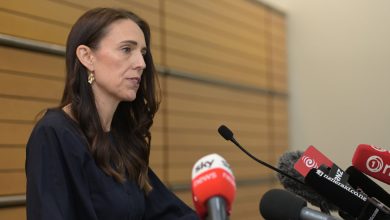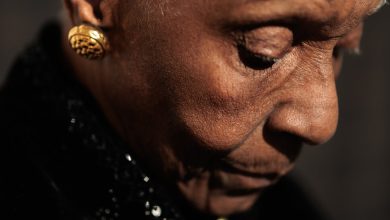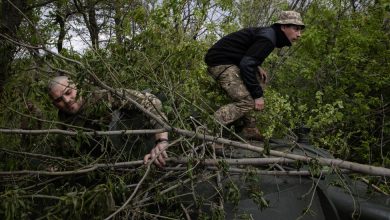How a Radio Station Is Empowering Women in a Rural Heartland

The women gather in a whitewashed room with a view of yellow mustard fields. They adjust their hijabs as they take seats on a dhurrie with a gaping hole. In their midst is the day’s star: an oval speaker.
“Friends, today we are going to talk about a topic that is extremely important for all of us,” the radio host announces in crisp Urdu. A 30-minute show on mental health follows. Then, a psychologist invited by the station initiates a group discussion in the room, where the women share their personal stories.
Meet “Alfaz-e-Mewat,” or the voice of the Mewati people, a community radio station that offers a mix of group therapy, education, women’s empowerment and entertainment. Its listeners are the million or so people of Nuh, a rural, agrarian district in the foothills of the Aravali mountains in the northern Indian state of Haryana. In this region — which has some of the country’s lowest female literacy rates, where early marriages are common and where violence against women is the norm — the station is the voice of change.
Even in a digital era, radio remains the preferred medium for millions of Indians. In Nuh, “Alfaz-e-Mewat” has played a groundbreaking role in changing attitudes toward Covid vaccinations, women’s education and their empowerment.
And it has been transforming for women like Bhagwan Devi, 51, who was inspired by the radio station to start a campaign to build toilets inside houses in her village. Traditionally, the people of Bhadas village used the fields as toilets, but while men freely used fields at any time of the day, women tended to go out only when the men were asleep.
“Radio made us realize that we could bring real change,” Ms. Devi said. “That we also have equal rights as men.”
The campaign started with a phone call to the station. “I said, ‘This is a big problem for us women here.’ They said, ‘We can help you.’”
This interaction from listeners like Ms. Devi, who got her radio set as a wedding gift in 1988, is what sets apart the radio station, which employs local people as reporters. Ms. Devi also sits on a committee that advises the station on content.
“Community radio gives women a platform not only as listeners to get information, but as active participants,” said Anjali Makhija, the chief executive of S.M. Sehgal Foundation, a nonprofit that started “Alfaz-e-Mewat” in 2012 with about $18,000 of government funding. The goal, initially, was to inculcate better water conservation and agricultural practices in this agrarian community.
But because most of the actual farming, mainly of millet, was done by women, the group knew that to meet its goals it first had to empower them to make better decisions about their own lives.
Only about a third of women in the district were literate; 90 percent of them dropped out of school before they were 10 years old. Girls were often the last to be fed in a household, typically after the men had eaten. It was also common for older men and women to bully, and at times be violent, toward their daughters-in-law.
“Abuse is so normalized in our culture that women think there is no point in talking about it,” said Subhi Agarwal, a psychologist and an independent researcher who has appeared on the station since 2019. So, she added, just being able to listen to radio programs tailored for them and discuss their problems was “a huge thing” for the women in the community. In at least one instance, the station helped connect a caller who complained of physical abuse from her husband with a local official who works to protect women from domestic violence.
Today, the station broadcasts 13 hours of content daily in Hindi, Urdu and Mewati on 107.8 FM across 225 villages in this broader region formerly known as Mewat, which is home to the country’s ethnic Meo Muslims and a minority Hindu population. This summer, Nuh was in the news because of communal riots. Daily programming is interspersed with folk songs, a “radio school” show for children and interviews from the field. Listeners can call in and request songs, or ask experts questions during live shows.
One recent morning, as four employees set up for a live program under the fluorescent lights of their two-room studio in Ghaghas village, the guest was Preeti Yadav, a medical officer from the district who discussed nutrition.
“Women here are neglected at home, so most of them are severely anemic,” Dr. Yadav said on the show. “You can make a protein-rich curry out of ground chickpeas,” she told listeners, answering a question about how to use easily available ingredients to enrich women’s diets.
In the nearby village of Sakras, Zubaida, who never went to school, now lives in an impressive bungalow. A longtime listener to radio broadcasts, she is known in the community for pushing her daughters through school, college and eventually into jobs typically held by men. One of them works in the office of the top government official in the area and drives a car, a rarity for rural women in this part of the country. Another hopes to study law in Britain.
“If there was no radio, my daughters would be sitting at home today,” said Ms. Zubaida, 61, who goes by one name.
In Hamzapur, a remote village in the district, young girls tiptoe through puddles of rainwater balancing large bundles of cattle feed on their heads. Young men zoom past on motorbikes. The hum of a harmonium echoes from a home with exposed bricks. Kalsum, 33, and her father-in-law sit in the courtyard, which has a freshly plastered mud floor, listening to “Qisse Kahani,” one of the station’s most popular shows, with folk songs sung by Mewati storytellers about brave kings and battlefields.
Ms. Kalsum, who was married at age 16 and has five children, said her father-in-law encouraged her to listen to the radio station so she could get important tips about pregnancy and child care. Despite being illiterate, those tips, which she said she internalized, helped her get a job as a local health worker responsible for other pregnant women and babies in the area.
“I never thought in my dreams that I would get a job,” she said, echoing a common feeling among women in Nuh that employment helped restore their dignity.
“Radio gave me everything,” Ms. Kalsum said.





